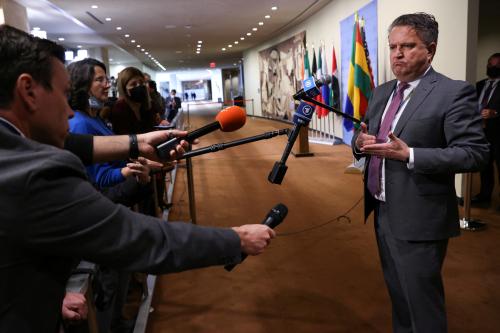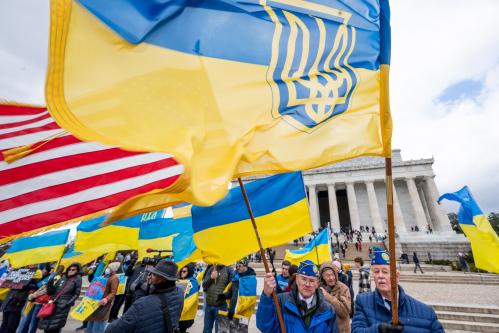This post was updated on May 26, 2022 to include two graphics.
In March 2022, a University of Maryland Critical Issues Poll showed that, despite public anger with the Russian invasion of Ukraine and support for U.S. actions to confront it, attitudes about President Joe Biden were largely unaffected. It also showed that a slight majority of Americans supported imposing a no-fly zone over Ukraine, despite expressed concerns about confrontation with Russia. To probe these issues and analyze possible reasons behind these expressed attitudes, we designed two experiments.
The first involved breaking our nationally representative sample of 2,091 adult respondents into two groups (every other respondent). In one subsample, we used “U.S. actions” and in the second, we used “Biden Administration actions” when referring to U.S. government responses to Russia’s invasion. Otherwise, we provided respondents with the same set of actions that have been carried out.
The second experiment also involved breaking the sample into two groups. In both subsamples, respondents were asked if they supported imposing a no-fly zone over Ukraine. In the first subsample, we noted that U.S. and NATO officials had said that a no-fly zone risks military confrontation with Russia; in the second subsample, we included no such introduction.
Here are six key takeaways from these experiments, as well as other results from the poll:
1
When respondents were presented with information about the dangers of a no-fly zone (NFZ), they were less likely to support it. This lack of support cut across partisan lines, suggesting that the Biden administration, which has opposed imposing a no-fly zone, has not done enough to create a link between NFZ and the risk of a direct war with Russia. When asked specifically about the NFZ, 53% of Americans supported the action; however, that number dropped to 40% when the question suggested that link. This was true across party lines, with 47% of Republicans and 59% of Democrats supporting a NFZ when given no other information, compared to 41% of Republicans and 39% of Democrats when linking this issue to direct U.S.-Russia conflict.

2
Looking at attitudes toward the Russian invasion, most Americans were most upset by the invasion being a “blatant violation of sovereignty and international law” (65% of all respondents, including 62% of Republicans and 68% of Democrats). This response was expressed at a greater rate than the attack being perpetrated against a democratic country (9% of all respondents, including 7% of Republicans and 13% of Democrats), attacking a country friendly to the U.S. (5% of all respondents, including 5% of Republicans and 4% of Democrats), or an attack on a European country (3% of all respondents, including 3% of Republicans and 4% of Democrats). These results suggest that Americans may be far more concerned about protecting a rules-based international order than defending democracy, even though the Biden administration has emphasized the threat to democracy in its messaging.

3
Six weeks after our first Ukraine poll, Americans’ willingness to pay a price in confronting Russia and holding it accountable appeared to have diminished. For example, only 59% of Americans were prepared to see higher energy prices, compared to 73% of respondents who responded similarly in March. Only half of respondents (52%) were prepared to see increased inflation in the current poll, compared to two-thirds of respondents (65%) in March. Only 27% of Americans were prepared to incur the loss of U.S. troops, compared to 32% of respondents in March. The decline in preparedness to pay a price was larger among Republicans, going from 58% to 44% on higher energy costs, and from 51% to 37% on increased inflation; in comparison Democrats went from 88% to 76% who were prepared to pay a price in higher energy costs, and from 78% to 68% on increased inflation. Both Republicans and Democrats were less supportive of sacrificing the lives of U.S. troops for this war effort (dropping from 29% to 22%, and from 35% to 31%, respectively).
4
There were notable differences in responses, depending on whether the question prompt referred to actions of the Biden administration or actions of the United States. Not surprisingly, differences in responses can be attributed to a gap in partisan attitudes, as merely invoking Biden’s name generated a strong response among Republicans.
- When asked about the early alert to the international community regarding Russia’s plans, 73% (including 61% of Republicans and 86% of Democrats) favored this when framed as an action undertaken by the U.S., compared to 57% (including 28% of Republicans and 86% of Democrats) in favor when the action was framed as initiated by the Biden administration.
- We also observed differences in framing when it came to mobilizing NATO support. 70% of respondents favored this action when framed as a response by the United States, compared to 60% support when the action was presented as a response from the Biden administration (58% of Republicans had a favorable view of an action if initiated by the United States compared to 38% if initiated by the Biden administration; Democrats were 85% and 84% favorable, respectively).
- Views were also more favorable about imposing sanctions on Russia when it was perceived as being undertaken by the U.S. (78% of respondents favored this if so framed, compared to 66% if framed as being by the Biden administration; among Republicans it was 72% vs. 46% and among Democrats it was 87% vs. 84%).
- A similar trend holds when examining support for supplying Ukraine with military equipment and intelligence. 73% of all respondents favor this action when it is perceived to be undertaken by the United States, (63% of Republicans and 83% of Democrats), compared to 66% support among all respondents is seen as an action by the Biden administration (55% of Republicans and 80% of Democrats).
- Respondents were more favorable toward ending U.S. imports of Russian energy when it was framed as an action by the U.S. (77% of all Americans, including 72% of Republicans) rather than one undertaken by the Biden administration (70% of all Americans, including 54% of Republicans).
- There was little difference in how respondents viewed sending U.S. or North Atlantic Treaty Organization (NATO) troops into combat or refraining from imposing a no-fly zone over Ukraine, based on whether these were the actions of the U.S. or the Biden Administration.
5
Despite these differences, majorities of respondents approved of most aspects of policies related to the war in Ukraine. Majorities had favorable views of these policies, regardless of whether they were perceived to be initiated by the United States, in general, or “the Biden Administration,” more specifically. The only exceptions were refraining from sending troops and refraining from imposing a no-fly zone, which clearly divided the public. In other words, despite the clear impact of partisanship, the public remains supportive of most of the specific actions taken by the Biden administration in response to Russia’s initial mobilization and its full-scale invasion of Ukraine.
6
If there was hope that the Ukraine war would reduce the sharp partisan divide in American politics, the evidence from our recent poll is discouraging. As noted in earlier analysis of our March poll, more Republicans identified Biden than identified Russian President Vladimir Putin as the world or national leader they disliked most. Since then, views of Biden have dropped further among Republicans, as the partisan divide has become more pronounced in public attitudes about the war. In our new poll, most respondents stated that their views of Biden had not been affected positively by the Russia-Ukraine war — despite high approval of specific policies.
Even worse for Biden, there was a slight drop in this regard from the March poll, when respondents were last asked if the Russian invasion of Ukraine and America’s response made their views of Biden more or less positive — 33% in May said they had a “more positive” view of Biden versus 36% who said the same in March. This was true even among Democrats, with 62% of respondents expressing a “more positive” view of Biden in May versus 67% in March.








Commentary
Measuring the impact of partisanship on attitudes toward the US response to the Russia-Ukraine war
May 24, 2022